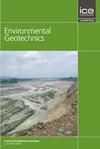基于前馈神经网络的希腊雅典Koropi粘土导向岩体材料特性估计
IF 2.2
4区 工程技术
Q3 ENGINEERING, GEOLOGICAL
引用次数: 0
摘要
岩石力学和通过现场试验估计其材料特性是土木和岩土工程的重要方面和挑战。然而,这一过程昂贵且难以实现,而机器学习和神经网络理论为在有限数据下估计材料性能提供了计算工具。本文给出了一种基于原位测量数据构建的前馈神经网络对黏性岩杨氏模量和黏性岩黏聚力的估计方法。输入值来自岩体的点荷载指数Is50、单轴抗压强度σs和比重γ的地质强度指数(GSI)建议值。收敛性分析表明,收敛发生在大约2000个epoch,最大L2均方误差范数不大于10−5。此外,还证明了增大γ的结果是岩石的刚度和强度的估计。上述特定部位的刚度增加可达20%,黏聚力增加可达25%。该模型除了可读性和准确性外,还提供了用更多的原位数据丰富模型的便利,从而增强了所提出的数值工具的灵活性。然而,它的适用性仅限于从特定地点获得的特定数据,因此更一般的估计需要更大的数据集。最后,根据文献中对黏性取向岩石的共同值的建议,对所提出的模型进行了论证,黏性取向岩石在现场是相当破碎的。本文章由计算机程序翻译,如有差异,请以英文原文为准。
An Estimation of Clayey-Oriented Rock Mass Material Properties, Sited in Koropi, Athens, Greece, through Feed-Forward Neural Networks
Rock mechanics and the estimation of their material properties through field tests are important aspects and challengees in civil and geotechnical engineering. However, this procedure is expensive and difficult to attain, while the machine learning and neural network theory provide a computational tool for estimating the material properties with limited data. In this work, an estimation of the Young Modulus and the cohesion of a clayey-originated rock through feed-forward neural networks constructed from in situ data measurements is given. The input values come from the Geological Strength Index (GSI) proposed values of the point load index Is50, the uniaxial compression strength σs, as well as the specific gravity γ of the rock mass. The convergence analysis revealed that the convergence occurs at approximately 2000 epochs, with the largest L2 mean square error norm being no greater than 10−5. In addition, it is demonstrated that augmenting γ results in the estimation of rock that is stiffer and stronger. The aforementioned increase in the specific site may be up to 20% for the stiffness and up to 25% for the cohesion. This model, aside from readability and accuracy, offers the convenience of enriching it with more in situ data, thereby enhancing the flexibility of the proposed numerical tool proposed. However, its applicability is limited to the specific data acquired from the particular site, so a more general estimation requires a substantially larger dataset. Finally, the justification of the proposed model has been carried out based on suggestions from the literature for common values of clayey-oriented rock, which is fairly disintegrated as seen in the field.
求助全文
通过发布文献求助,成功后即可免费获取论文全文。
去求助
来源期刊

Environmental geotechnics
Environmental Science-Water Science and Technology
CiteScore
6.20
自引率
18.20%
发文量
53
期刊介绍:
In 21st century living, engineers and researchers need to deal with growing problems related to climate change, oil and water storage, handling, storage and disposal of toxic and hazardous wastes, remediation of contaminated sites, sustainable development and energy derived from the ground.
Environmental Geotechnics aims to disseminate knowledge and provides a fresh perspective regarding the basic concepts, theory, techniques and field applicability of innovative testing and analysis methodologies and engineering practices in geoenvironmental engineering.
The journal''s Editor in Chief is a Member of the Committee on Publication Ethics.
All relevant papers are carefully considered, vetted by a distinguished team of international experts and rapidly published. Full research papers, short communications and comprehensive review articles are published under the following broad subject categories:
geochemistry and geohydrology,
soil and rock physics, biological processes in soil, soil-atmosphere interaction,
electrical, electromagnetic and thermal characteristics of porous media,
waste management, utilization of wastes, multiphase science, landslide wasting,
soil and water conservation,
sensor development and applications,
the impact of climatic changes on geoenvironmental, geothermal/ground-source energy, carbon sequestration, oil and gas extraction techniques,
uncertainty, reliability and risk, monitoring and forensic geotechnics.
 求助内容:
求助内容: 应助结果提醒方式:
应助结果提醒方式:


